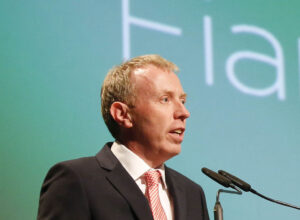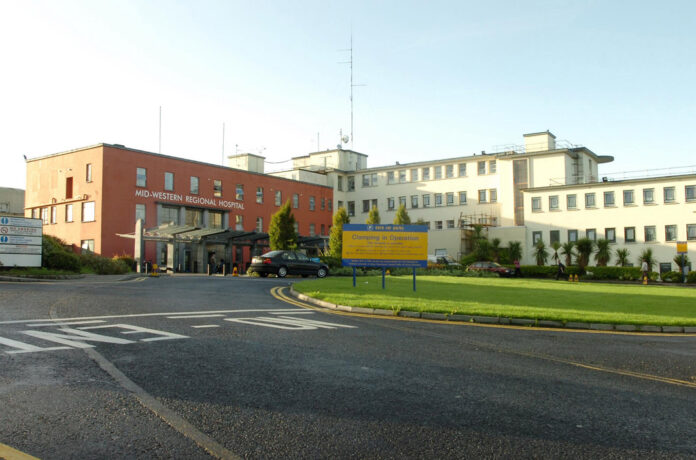“Explosive” revelations about the work practices of consultants in the Mid-West’s acute hospitals have prompted calls for an independent public inquiry into the running of theatre facilities.
A report prepared by healthcare consultants, Meridian Productivity Limited, in 2013 revealed late starts by consultants in all hospitals in the UL Hospitals’ Group was a regular feature that was going “unchallenged” in the majority of cases. It outlined there was no clear definition or means of reporting utilisation of theatres, excessive theatre overruns in Dooradoyle and last minute communication of theatre list content.
It stated there was “poor theatre start and end punctuality” and a transfer of only a “very small amount of procedures” from UHL to Ennis and Nenagh hospitals, which is contrary to commitments given when 24-hour emergency services were removed from those hospitals in April 2009.
UL Hospitals’ Group has welcomed the recommendations made in the report, which it said has helped to improve efficiencies in theatres and insists start and finish times have improved, while consultants are co-operating with the transfer of work to Ennis and Nenagh hospitals.
The Irish Hospital Consultants’ Association declined to comment on the report’s findings, while the Irish Medical Organisation had not responded to a number of queries at the time of going to press.

Clare Deputy Timmy Dooley has called for an independent inquiry into the alleged failure of the group to utilise all the existing resources in the hospital network efficiently.
“We have never seen material as explosive as these findings. We were told there were issues around consultants, which were regarded as heresay. For a consultancy report to comment, as it has, is explosive.
“It is clear there are vested interests holding up the transfer of services to Ennis and Nenagh for self-interest,” he alleged, adding, “It would appear the health service is being hijacked by a certain cohort of people while government ministers sit on their hands and ignore the impact it is having on the lives of patients in the Mid-West Region.”
He claimed the findings of this report illustrates an almost “animal farm” management structure where consultants seem to have absolute control, with no checks and balances in place to ensure appropriate use of all hospital facilities.
The report by Meridian Productivity Limited into the use of theatres, obtained by The Clare Champion in response to a Freedom of Information request, revealed a number of deficiencies based on a control system audit dated Wednesday, April 25, 2013.
The report stated meetings were set up to look at procedures that could be moved out of University Hospital Limerick and increase the utilisation of theatres in the other sites.
“A number of meetings were attended by the clinical director and directorate manager with specialities such as gynaecology and ENT in order to discuss the movement of procedures and, in some cases, whole lists to alternative day case theatres.
“These proposals were met with hostility and the process has not been taken any further,” it stated. “A very small amount of procedures have been moved out from the regional hospital to other sites but these have had a very minimal effect upon the utilisation of theatres in other areas.
“It has been noted that a lot of the procedures that have been moved out or are being planned to move out are private patients and this has a cost implication in that the income from these patients would then go to another hospital and affect the private income targets of the regional.”
“This may also cause bad feelings amongst anaesthetists because they will be getting a reduced amount of private work,” the Meridian Report continued.
Across the region, the report pointed out the largest continuing problem in relation to the key performance indicators set in the report is trying to achieve zero late starts.
“This is due to a number of factors but consultants not starting on time is a common theme across all sites. There is no procedure in place for when this occurs and, in the majority of cases, it is going unchallenged. The issue of available beds and surgical beds not being ring-fenced is the most prevalent reason in Dooradoyle for late starts,” the audit stated.
According to the UL Hospitals’ Group, isolating a single week over a review process that took several months does not give a full picture of the progress made regarding improvements in theatre utilisation.
The group pointed out day surgery in Ennis has increased by over 30% from 2012 to 2014. “Start times and finish times, as a whole, have improved across the group and are continually reviewed to achieve best utilisation. Such is the nature of surgery, in any event, that theatre overruns can never be entirely eliminated and this is particularly true at UHL, where the most complex procedures are performed.
“Lists are planned in accordance with best practice but issues related to specific patients inevitably lead to theatre overruns. Patient safety must always take precedence over theatre finishing times.
“We are satisfied that the project has delivered and continues to deliver significant savings through increased productivity, earlier starts and earlier finishes, a reduction in overtime and time owing, and better utilisation of our group’s most expensive asset, our operating theatres.
“It should be noted that the audit of April 2013 was an interim audit only, which identified a number of actions that were followed up on,” the group stated.
In addition to the continuation of surgical services in Ennis and Nenagh, after surgical services were re-organised the group pointed out they have since been augmented and enhanced by the transfer of day procedures in vascular surgery, general surgery, urology, plastic surgery, dermatology, gynaecology and orthopaedic surgery.
The group pointed out Ennis and Nenagh hospitals should be congratulated as they are the best performing hospitals in the country when it comes to meeting national waiting list targets.
“Because of our productive theatres, it has ensured that we have been able to maintain our surgical lists, despite peak winter surges,” the group stated.

Deputy Michael McNamara has voiced his concerns to Health Minister, Leo Varadkar.
While Deputy Michael McNamara doesn’t support calls for a public inquiry, he has written to Health Minister Leo Varadkar and CEO of the UL Hospitals’ Group, Colette Cowan, asking how they intend to ensure that day cases are transferred out to Ennis and Nenagh in greater numbers.
Dan Danaher
A native of Ennis, Colin McGann has been editor of The Clare Champion since August 2020. Former editor of The Clare People, he is a journalism and communications graduate of Dublin Institute of Technology.


